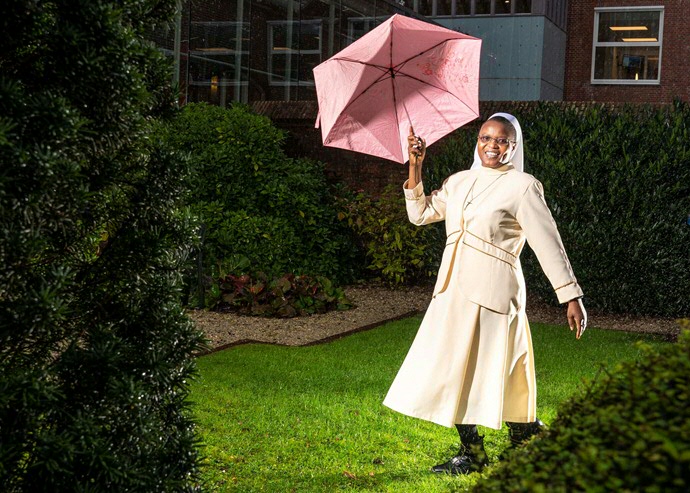Seksuele en reproductieve gezondheidsrechten van Korekore-vrouwen in Zimbabwe

PhD-student én non in de Orde van de Little Children of the Blessed Lady (LCBL) Elizabeth Revai Mudzimu deed onderzoek naar de strategieën die de Korekore-vrouwen in Mount Darwin district in Zimbabwe toepassen bij het omgaan met de druk die door de rooms-katholieke leer over seksualiteit en de Afrikaanse geloofsovertuigingen en -praktijken, specifiek die van de Korekore, wordt uitgeoefend op hun reproductieve gezondheidsrechten (in het Engels afgekort als SRHR: Sexual and Reproductive Health and Rights). Op donderdag 11 februari verdedigt Elizabeth haar PhD-thesis om daarmee de doctorale graad in Religiestudies aan de Faculteit Godgeleerdheid en Godsdienstwetenschap te krijgen.
‘Leren over de uitdagingen en moeilijkheden die vrouwen tegenkomen’
Elizabeth legt uit waarom ze voor dit onderzoeksonderwerp koos: ‘Tien jaar lang met vrouwen werken in pastorale, ontwikkelings- en empowermentprogramma’s in Zimbabwe bood me de mogelijkheid om te leren over de verschillende uitdagingen en moeilijkheden die vrouwen tegenkomen. Soms kon ik geen antwoorden op issues vinden, waardoor mijn interesse gewekt werd om deze wetenschappelijk te gaan onderzoeken. Seksualiteit is, ook al is het een van de grootste actuele uitdagingen voor Afrikaanse vrouwen, vaak geen onderwerp van publieke discussie – iets wat natuurlijk niet alleen zo is in Afrikaanse contexten. Dit maakte dat ik me wilde verdiepen in het leven van vrouwen om meer te weten te komen over hun geleefde SRHR-ervaringen, niet vanuit pastoraal maar vanuit wetenschappelijk perspectief.’
Religie en SRHR: een onderbestudeerd veld
‘Mijn onderzoek draagt bij aan de bestudering van religie en het SRHR-discours, een onderbestudeerd terrein, waarbij ik het voorbeeld van de Korekore-vrouwen in Zimbabwe gebruik,’ vervolgt Elizabeth. ‘Het laat zien hoe religie en cultuur discoursen kunnen formuleren die, vanuit interpretatief perspectief, door gelovigen als een gegeven worden aangenomen en als een dictaat worden opgevolgd. Het onderzoek laat ook zien hoeveel macht religieuze doctrines (geschreven en ongeschreven), instituties en leiders hebben als het gaat om het bepalen hoe mensen met bepaalde kwesties in de publieke sfeer omgaan, in dit geval met SRHR. Het SRHR-discours is de achtergrond waartegen ik de functie van religie in het leven van mensen heb bestudeerd en deze thesis laat zien hoe religieuze instituten publieke discoursen kunnen framen, zowel op een bevrijdende als een onderdrukkende manier.’
Observaties en conclusies
Elizabeth geeft enkele voorbeelden van al te makkelijke aannames over de seksualiteit van Afrikaanse vrouwen die ze met kwalitatief onderzoek aan het licht heeft weten te brengen: ‘Ik – en met mij vele wetenschappers – dacht altijd dat Afrikaanse vrouwen weinig macht (agency) hadden over hun seksualiteit. Er werden te gemakkelijke conclusies getrokken dat vrouwen met veel kinderen onderdrukt zouden zijn, terwijl dit in sommige gevallen juist hun eigen keuze is, omdat het een vorm van veiligheid biedt. Ook was het fascinerend om erachter te komen dat volgzaamheid, dat vooral als een uitdrukking van onderdrukking en gebrek aan macht en controle wordt gezien, toch omgezet kan worden naar een vorm van zelfbeschikking. Hoe dan ook, dit onderzoek ging verder en analyseerde op een kritische manier of deze vorm van agency transformerend en duurzaam is. De conclusie was dat dit in de meeste gevallen niet zo is en er dus meer empowermentprogramma’s nodig zijn. Door de Korekore-vrouwen in Zimbabwe als voorbeeld te gebruiken, concludeerde ik ook dat een uitgebreid begrip van het SRHR-discours niet mogelijk is zonder het bevragen en beschouwen van de religieuze en culturele ideeën die het fundament vormen van de ervaringen en strategieën die mensen gebruiken bij het omgaan met uitdagingen op SRHR-gebied.’
Liefde voor het academisch leven
Hoewel Elizabeth bij toeval aan de Rijksuniversiteit Groningen terechtkwam – na haar masterdiploma wilde ze haar onderzoek voortzetten en kon ze via Nuffic toevallig een PhD-plek krijgen in Groningen – stelt ze nu: ‘Het was mijn lot dat ik hier beland ben en ik ben trots aan zo’n prestigieuze, hooggewaardeerde en competitieve universiteit te hebben mogen studeren. De RUG blinkt uit in academische excellentie en innovatie. Ja, na vier jaar aan deze prachtige universiteit ben ik het helemaal eens met sommige mede-Groningers: er gaat niets boven Groningen! Na heel hard gewerkt te hebben om mijn thesis ruim voor het eind van mijn contract af te ronden, neem ik nu een jaartje vrij om te ontspannen, om daarna mijn werk in onderzoek, onderwijs en ontwikkelingsprojecten voor vrouwen weer op te pakken. Ik hou van het academische leven en daarom blijf ik in de academia en wil ik mijn kennis op het gebied van SRHR, religie, cultuur, transformatie en duurzaamheid vergroten.’
Promotieceremonie
Op donderdag 11 februari zal Elizabeth Revai Mudzimu haar dissertatie met de titel Religious and Cultural Encounters: Sexual and Reproductive Health and Rights among the Korekore Women in Zimbabwe verdedigen tijdens een promotieceremonie in het bijzijn van haar promotor prof. dr. Kocku von Stuckrad, hoogleraar Religiewetenschap, en co-promotor dr. Joram Tarusarira, universitair docent Religion, Conflict and Peacebuilding aan de Faculteit Godgeleerdheid en Godsdienstwetenschap van de Rijksuniversiteit Groningen. Veel succes Elizabeth, Tinokusuvira rombo rakanaka!
- Wanneer: Donderdag 11-02-2021
- Aanvang: 12:45
- Waar: Livestream vanuit het academiegebouw
- Proefschrift
Meer nieuws
-
06 januari 2026
Geschiedenis dichterbij brengen
-
10 juni 2025
RUG en Rijksmuseum tekenen samenwerkingsovereenkomst
